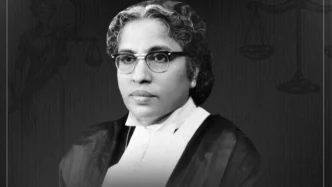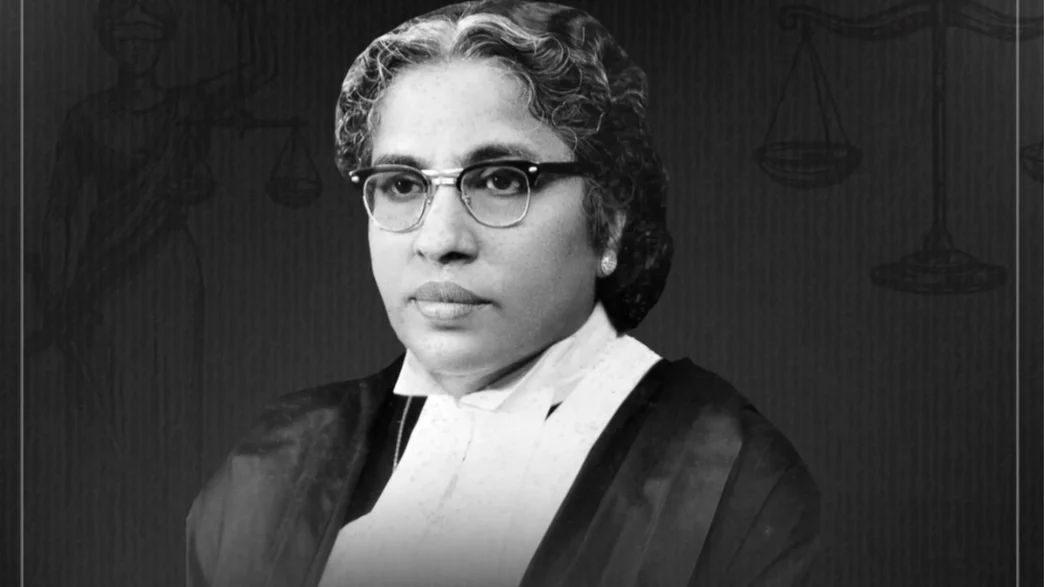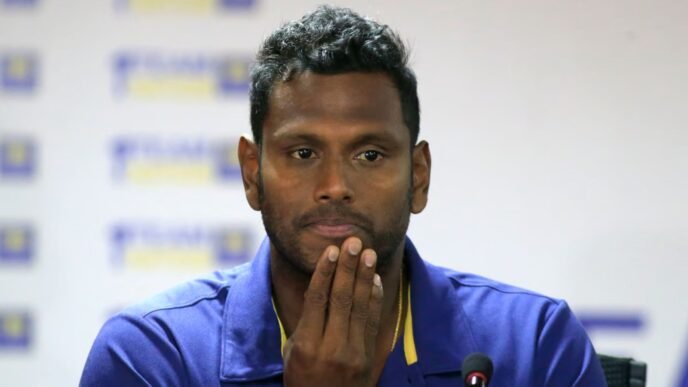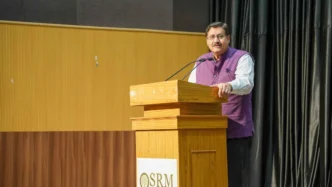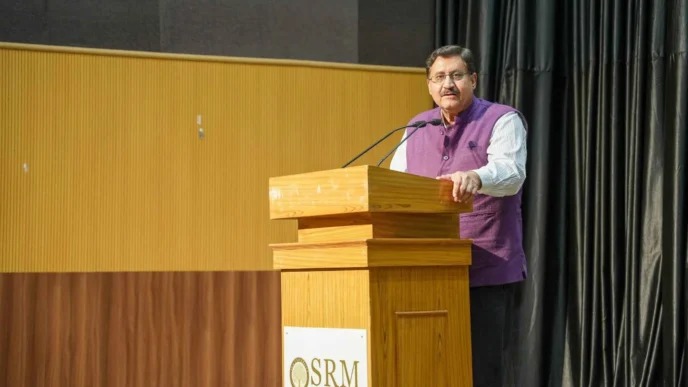While another round of wars and political confusions gripped the 20th century, certain individuals stood above it all and did something great for mankind and human rights. One such stalwart woman was Justice Anna Chandy, a trailblazer for women’s rights and social justice in India. Born in 1905, Justice Chandy would be the first woman in India to serve as a high court judge, indeed an impeccable legacy for law and feminism. This life was devoted and dedicated toward furthering women’s rights and gender equity and questioning the patriarchal mores deeply entrenched within Indian society.
Early Life of Anna Chandyand Foundation for Feminism
Justice Anna Chandy, hailing from a matrilineal background in the family in Thiruvananthapuram, Kerala, is basically a lady brought up by the female members of the family since the father died in early life. The social ethos shaped by the matrilineal tradition of Kerala, where the lineage and inheritance could not trace their origin in the male line but on the mother’s side, has affected her perception. It endowed her with the ability to lead an independent life, a virtue that she would grow to possess all of her life in the world where women did not utter much and were indeed considered to be allowed with wishes or aspirations.
Against this backdrop, Anna Chandy fearlessly enrolled herself in law college as the first woman in Kerala. She had to withstand sharp tongue-lashings and ridicule at the hands of peers and classmates in largely a male-dominated education community, but she emerged on top and with flying colors in her studies. Resilience and Success in College: Her success told everyone clearly that women were good enough for all pursuits, even the ones dominated by men. Anna Chandy was graduated in law; she also achieved admission to the bar in 1929 and broke the glass ceiling within two decades of joining the judiciary. She became the first female incumbent of a judicial office in the Kerala district courts.
Legacy of a High Court Judge
Anna Chandy judicial career was crowned by her appointment to the Kerala High Court in 1959, where she became India’s first female high court judge. She became one of the biggest steps forward for women in the Indian judiciary. At a time when definite roles were ascribed to women in domesticity, she was an example. She became a sort of portent on the bench that demonstrated that women could indeed form the major functions of the justice system.
During all the years she held office, Justice Anna Chandy stood for principle, upholding natural justice and human rights. Acutely socially conscious, her judgments always reflected a balanced approach that ensured the rights of both parties-the accused and the aggrieved. Her commitment to fair trials and her balance of perspectives would be the benchmarks for the modern judiciary.
Advocating for contraceptive rights and women’s autonomy
Justice Anna Chandy had been a vocal campaigner for women’s reproductive rights and had been instrumental in early debates regarding contraception within the Indian nation. For a people whose conversations on reproductive health have always been very much stigmatized, her work was revolutionary and provoking in equal measure. She started her campaigning by advocating abstinence as a means of birth control, supporting the views of the times, but soon realized the necessity of easy access to contraception for women and demanded that they own and control their bodies.
Proposing the establishment of birth control clinics and the provision of contraceptive information all over the country was a stand that Justice Anna Chandy proposed in her historic resolution at the 1935 All India Women’s Congress. Her position on contraception thus opined she believed in woman’s autonomy – a radical principle for the period. While she was supported on contraception, Anna Chandy was rather conservative on abortion since she held the same precepts that governed Christianity. She believed the human life is sacred and legal scholars argue that this view must have been a result of her religious background. Yet she was a women who argued for the rights of reproducing herself, creating and preparing the soil for future debates on the autonomy of women and their reproductive rights in India.
Advocate of Women Employment Rights and Gender Equality
Justice Anna Chandy was a fierce advocate for women’s employment rights and equality. In a society which tended to ‘penetrate’ people according to their role in the economy, she very forcefully argued on behalf of the right to equal pay, equal opportunities, and the right to work irrespective of whether one was married or not. Debates she has had with a legislator named Velu Pillai of Travancore are noteworthy because she kept disarming his possible arguments against employed married women.
Pillai argued that the working of a married woman might be injurious to her husband’s self-respect and also that employment would divert her attention from duties which that women in general owes to her household. Justice Chandy countered these by explaining that self-respect was not the monopoly of manhood alone and that, under certain circumstances, the wife’s monetary earnings were absolutely necessary for the family when the earning capacity of the husband was nil. Her arguments were logical and incisive, bringing out her forensic ability in reasoning for women’s emancipation.
Apart from her legal contributions, Justice Chandy made an impact on journalistic discourse also. She founded and edited *Shrimati*, Malayali periodical that has been a vehicle to empower women’s voices and rights. Some of the subjects covered by the publication are as follows: widow remarriage, gender equality, and employment among women. Through *Shrimati*, Justice Chandy also provided women in Kerala with an opportunity to air their concerns and their expectations in a public forum while challenging society’s perceptions and contributing to and nudging progressive dialogue forward.
Legacy and Lasting Influence
Justice Anna Chandy’s life and work inspire generations of women both in India and elsewhere. Her autobiography *Aatmakatha* is a reflection on her struggles and successes through her life, therefore giving a personal account of her own journey towards gender equality. She remained active in legal circles even after retirement from the judiciary, as a member of the Law Commission of India, and continued to work on legal reforms and for women’s rights.
At such times, it becomes relevant to view the legacy of Justice Chandy against the backdrop of a conscience-keeping India struggling to strike a balance in her representation in courts. The fact that women still constitute only around 10.6% of judges in Indian higher courts is another development initiated by her initiative. This context is also marked by the fact that no woman has yet had the chance to become Chief Justice of the Supreme Court of India, which is beset with a concern for gender balance and equality in the positions of authority.
Justice Anna Chandy represents the futility of the superhuman triumphal spirit in the face of social adversity. She broke certain hesitations and opened new fields for women in law, politics, and journalism; however in trying to see behind her uprightness in the administration of justice finds that Justice Chandy was not only a figure of the law but also a beacon of hope and change. The legacy remains with us and reminds us of the constant need for equality, justice, and the struggle of women in India and the world.
FAQs
-
Who is Justice Anna Chandy?
Justice Anna Chandy was the first woman in Indian history to be designated as a high court judge and considered as the first female advocate from Kerala; a pioneer for women’s rights and gender equality within law and society.
-
What are the contributions of Justice Chandy towards the woman’s reproductive rights?
Advocating for availability of contraception, believing in a woman’s ability to decide what goes on in and with their bodies and promoting awareness of reproductive health.
-
How did Justice Chandy promote gender equality in employment?
She supported equal pay and equal opportunities for women, backing work rights for married women, while countering the argument that working required women to give up their household roles.
